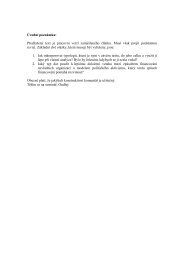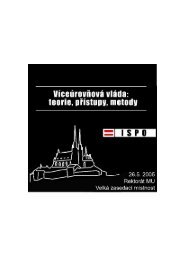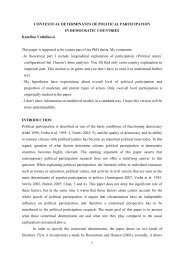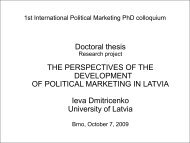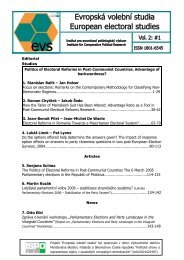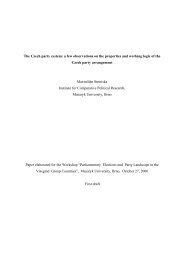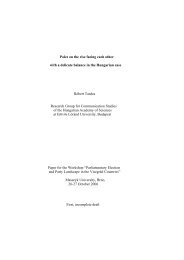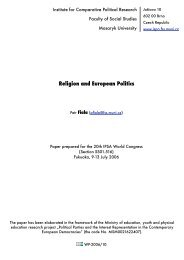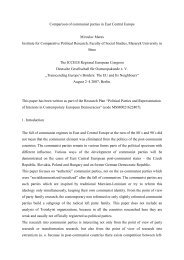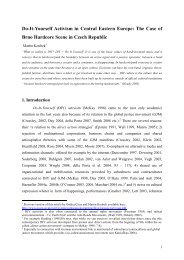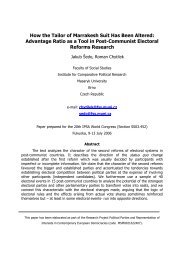Agrarian and Peasant Parties in the Czech Republic - Masarykova ...
Agrarian and Peasant Parties in the Czech Republic - Masarykova ...
Agrarian and Peasant Parties in the Czech Republic - Masarykova ...
Create successful ePaper yourself
Turn your PDF publications into a flip-book with our unique Google optimized e-Paper software.
<strong>in</strong>terl<strong>in</strong>ked to <strong>the</strong> degree that allowed for a k<strong>in</strong>d of unification, <strong>in</strong> <strong>the</strong> end <strong>the</strong>y all failed <strong>and</strong><br />
disappeared after 1996 parliamentary election, leav<strong>in</strong>g no chance to establish viable centrist<br />
coalition (Pšeja 2005: 83, 86-7).<br />
While absence of numerous electoral bases def<strong>in</strong>itely played a crucial role <strong>in</strong> marg<strong>in</strong>alization of<br />
<strong>Czech</strong> agrarian parties, we should not underestimate <strong>in</strong>fluence of o<strong>the</strong>r parties. As early as <strong>in</strong><br />
1990 parliamentary election <strong>the</strong>re were o<strong>the</strong>r parties – besides Alliance of Farmers <strong>and</strong><br />
Countryside – pay<strong>in</strong>g more or less extensive attention to rural <strong>and</strong> agriculture issues: for example<br />
Civic Forum (Ob!anské fórum /OF/), <strong>Czech</strong>oslovak People’s Party (#eskoslovenská strana<br />
lidová /#SL/) or Communist Party of <strong>Czech</strong>oslovakia (Komunistická strana #eskoslovenska<br />
/KS#/) (&ehák, &eháková 1991). What is more, each of <strong>the</strong>se parties was related to rural <strong>and</strong><br />
agriculture issues <strong>in</strong> different way: while agricultural policy of Civic Forum reflected necessity of a<br />
thorough transformation of agriculture <strong>and</strong> <strong>in</strong>cluded also emphasis on remedy<strong>in</strong>g <strong>in</strong>justices of<br />
former regime (e.g. nationalization of agriculture property, which now should be returned to<br />
orig<strong>in</strong>al owners), two o<strong>the</strong>r parties were much more traditionally focused. While KS# defended<br />
<strong>in</strong>terests of members of common agriculture co-operatives <strong>and</strong> tried to highlight importance of<br />
co-operative farm<strong>in</strong>g, policies of #SL reflected its regional <strong>and</strong> ideational roots – #SL has had its<br />
strongest base <strong>in</strong> rural <strong>and</strong> religious areas of Sou<strong>the</strong>rn Moravia <strong>and</strong> Eastern Bohemia, which<br />
obviously makes rural <strong>and</strong> agricultural issues important part of its agenda, with a special emphasis<br />
on private ownership.<br />
However, <strong>the</strong>re was ano<strong>the</strong>r <strong>in</strong>trigu<strong>in</strong>g development that def<strong>in</strong>itely deserves some attention. The<br />
part of former pre-war members of <strong>the</strong> <strong>Republic</strong>an Party of Farmers <strong>and</strong> <strong>Peasant</strong>s <strong>and</strong> its youth<br />
organization entered <strong>the</strong> newly founded Assembly for <strong>the</strong> <strong>Republic</strong>–<strong>Republic</strong>an Party of<br />
<strong>Czech</strong>oslovakia (Sdružení pro republiku–Republikánská strana #eskoslovenska /SPR-RS#/).<br />
This party, headed by a populist politician Miroslav Sládek, declared itself a successor to <strong>the</strong><br />
<strong>Republic</strong>an Party of Farmers <strong>and</strong> <strong>Peasant</strong>s; however, <strong>in</strong> fact it was <strong>the</strong> extreme right party. The<br />
pre-war agrarians mostly left <strong>the</strong> party as early as <strong>in</strong> 1990 due to disputes with Sládek – for<br />
example, Sládek rejected <strong>the</strong> cooperation with <strong>the</strong> Free <strong>Peasant</strong>s’ Party <strong>and</strong> Christian <strong>and</strong><br />
Democratic Union, which was supported by agrarians <strong>in</strong> <strong>the</strong> SPR-RS# (Mareš 2003: 190-192).<br />
Despite <strong>the</strong> fact that SPR-RS# later elaborated agrarian programme, it was not an agrarian party.<br />
The SPR-RS# represented <strong>the</strong> extreme right party family <strong>in</strong> <strong>the</strong> <strong>Czech</strong> Parliament <strong>in</strong> 1992-1998,<br />
but s<strong>in</strong>ce <strong>the</strong> end of <strong>the</strong> 1990’s it has grown marg<strong>in</strong>al.<br />
In <strong>the</strong> post-1989 <strong>Czech</strong> politics <strong>the</strong> “republicanism” as a political “mark” was mostly connected<br />
with extreme right w<strong>in</strong>g populism or with conservatism <strong>in</strong>spired by American <strong>Republic</strong>an Party,<br />
not dom<strong>in</strong>antly with agrarianism of <strong>the</strong> pre-war period. The limited ideological relations to <strong>the</strong><br />
14



